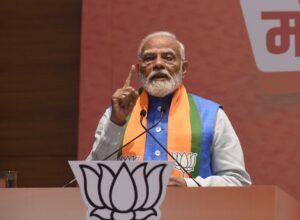3 foreign NGOs stop work in Afghanistan after Taliban ban women staff
Kabul, Afghanistan (AFP):
Three foreign aid groups have announced that they are suspending their operations in Afghanistan after the country’s Taliban rulers ordered all NGOs to stop female staff from working.
Their announcement prompted warnings from a top UN official in Afghanistan and from NGOs that humanitarian aid would be hard hit.
“We cannot effectively reach children, women and men in desperate need in Afghanistan without our female staff,” Save the Children, the Norwegian Refugee Council and CARE said in a joint statement.
“Whilst we gain clarity on this announcement, we are suspending our programmes, demanding that men and women can equally continue our lifesaving assistance in Afghanistan.”
The Taliban government’s ‘temporary’ order issued by the ministry of economy drew swift international condemnation. The Taliban cite the lack of observance of the required dress code for women as the reason behind the order.
These policies are often justified by the Taliban based on their highly conservative interpretation of Islam. However, the overwhelming majority of Islamic experts and scholars are unanimous on the point that Islam does not bar women from higher education or pursuing careers.
Less than a week ago, the hardline government also barred women from attending universities, prompting global outrage and protests in some Afghan cities.
The ministry threatened to suspend the operating licences of aid organisations that failed to stop women from working.
It said it had received “serious complaints” that women working in NGOs were not observing a proper Islamic dress code.
The UN chief’s deputy special representative for Afghanistan, Ramiz Alakbarov, says that the ban will impede aid delivery to millions of people and also have a “devastating” impact on the country’s dilapidated economy.
“It will be very difficult to continue and deliver humanitarian assistance in an independent and fair way because women’s participation is very important,” Alakbarov said.
“We are going to discuss this matter with the authorities… We will insist on reversal of the ban.”
‘Devastating economic impact’
At a meeting of humanitarian officials on Sunday, there was no decision over whether all NGOs would suspend operations, according to Alakbarov, who added that more discussions would be held.
He acknowledged that the ban would impact the UN’s operations as it distributes aid through a vast network of NGOs.
“There is a direct impact on our ability to deliver the programme and on our ability to deliver assistance like food and non-food items,” he said.
The ban will also have a “very devastating” impact on Afghanistan’s economy, already in a tailspin since the withdrawal of foreign forces in August last year.
“All assistance which is being provided to Afghanistan in this period is very critical, both for the nutritional security and to the job security of the people,” he said.
Afghanistan’s economic crisis has worsened since the Taliban seized power, which led to Washington freezing billions of dollars of assets and foreign donors cutting aid.
Dozens of organisations work across remote areas of Afghanistan and many employ women, with several warning the ban will affect their activities.
“Some NGOs have up to 2,000 women employees, and in most of the cases they are the only breadwinners for their families,” Alakbarov said.
Shabana, 24, said she was the only earning member in her family.
“If I lose my job, my family of 15 members will die of hunger,” said Shabana, who has worked for a foreign NGO for decades and gave only one name.
The ministry said women working in NGOs were not observing “… rules and regulations pertaining to the work of females in national and international organisations”.
However, NGO staff dismissed the charge.
“Our offices are gender segregated, and every woman is properly dressed,” said Arezo, who works for another foreign NGO and also gave only one name.
The international community has made respecting women’s rights a sticking point in negotiations with the Taliban government for its recognition and the restoration of aid.











